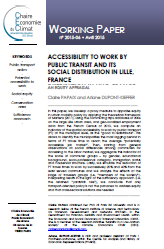
Accessibility to work by public transit and its social distribution in Lille, France. An equity appraisal
by Claire Papaix and Ariane Dupont-Kieffer
In this paper, we develop a proxy measure to appraise equity in urban mobility policy by applying the theoretical framework of Martens (2011). Using the commuting trips database of 2006 on the large Lille urban area, and geo-localized employment data from the French Census of 2010, we compute an indicator of the spatial accessibility to work by public transport (PT) at the municipal level, as the “good to redistribute”. This allows to identify the municipalities the most lagging behind in terms of PT travel time to reach the average “potentially accessible job market”. Then, starting from general observations on social differences among commuters for accessing to the labor market, we aggregate this indicator at the scale of commuter groups – by gender, educational background, socio-professional category, immigration status and household structure. Lastly, we simulate the reduction of PT travel times to work by successively 20% and 40% from the least served communes and we analyze the effects at the stage of travelers groups (i.e. “members of the society”). Interpreting results in the light of the sufficiency approach (i.e. the retained “yardstick rule”), we conclude that only transport-oriented policy is not the panacea to address equity and that cross-sectoral solutions are needed
